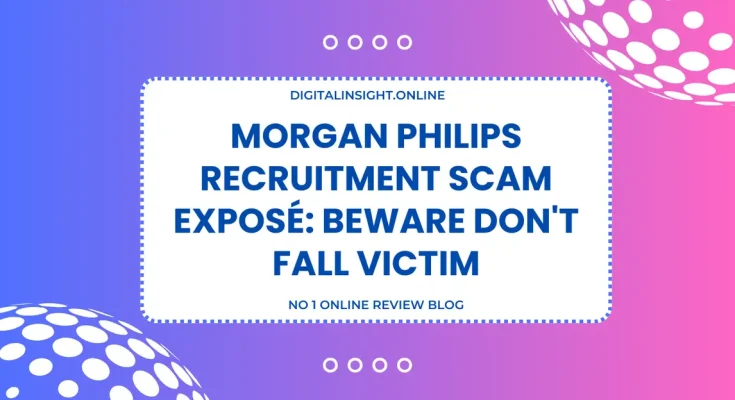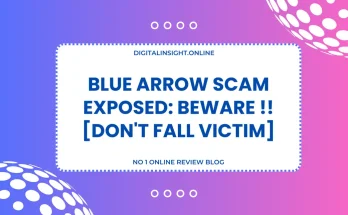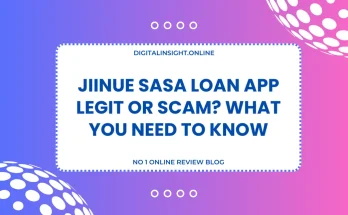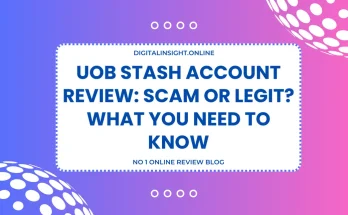Recruitment scams have evolved at a rapid pace over recent years. Fraudsters are becoming increasingly sophisticated—and one of the scams that have caught the attention of job seekers worldwide is the impersonation of recruiters from leading firms like Morgan Philips Group.
In this post, we break down everything you need to know about the Morgan Philips recruitment scam. We’ll explain how scammers operate, the red flags to watch out for, and offer actionable steps to protect yourself.
Let’s dive right in!
What Is the Morgan Philips Recruitment Scam?
In recent months, candidates have reported receiving unsolicited WhatsApp messages or social media contacts from individuals posing as recruiters from Morgan Philips Group.
These messages often promise attractive job opportunities, sometimes accompanied by a casual tone, emojis, or unexpected communication methods that deviate from industry standards.
Fraudsters may use logos, names, or email addresses that mimic legitimate Morgan Philips communication channels. Their goal is to trick you into divulging personal details or even paying fees under the guise of “screening” or “processing” charges.
Unlike reputable recruiters who connect with candidates via official channels (such as corporate email addresses from an @morganphilips.com domain, phone calls, or LinkedIn messages), scammers tend to use WhatsApp or other messaging apps.
These imposters often create a sense of urgency, advising that an incredible job opportunity is slipping away if you do not act quickly.
“Our official recruiters at Morgan Philips Group will always reach out using professional channels and will never ask you for fees or sensitive personal information via WhatsApp.”
– Morgan Philips Group
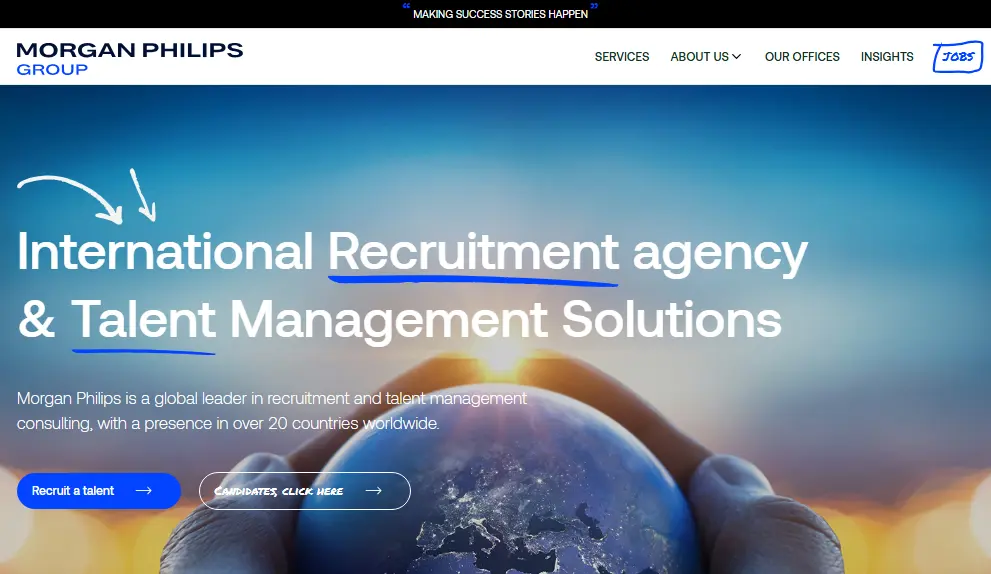
How Do Scammers Impersonate Morgan Philips?
To understand how to protect yourself, it’s essential to know the methods fraudsters employ:
1. Fake Social Media Profiles:
Scammers create profiles that closely resemble those of legitimate recruiters. They often copy images, titles, and even include a company description similar to Morgan Philips Group.
2. Improper Use of Communication Tools:
Real recruiters follow formal processes. In contrast, scammers use informal apps like WhatsApp or non-corporate email addresses (e.g., Gmail or Yahoo) to initiate contact.
3. Inconsistent Branding:
You might notice variations in logos, slight misspellings, or outdated branding elements that differ from the authentic Morgan Philips style.
4. Lack of Professionalism:
Poor grammar, excessive punctuation, and a casual tone (such as the use of emojis) can often signal that the communication is not from the legitimate recruitment team.
Red Flags 🚩: How to Spot the Scam
Here’s a quick checklist to determine if a recruiter might be fraudulent:
1. Unexpected Contact:
Have you received a job offer you didn’t apply for? If the message is unsolicited, it’s worth a closer look.
2. Non-Corporate Contact Details:
Authentic communications from Morgan Philips Group come from official domains. If you see an email address ending in @gmail.com or a WhatsApp number from a personal mobile, that’s a red flag.
3. Poor Language and Unprofessional Tone:
Look for grammatical errors, overuse of emojis, or a casual tone. Professional recruiters maintain a clear, concise, and formal style.
4. Pressure Tactics:
Scammers create urgency—“apply now or the opportunity is gone!” Genuine recruiters allow you time to respond thoughtfully.
5. Requests for Fees or Personal Data:
No legitimate recruiter requires an advance fee for interviews or employment processing. Be cautious if you’re asked for bank details, social security numbers, or any other sensitive information.
6. Inconsistent Job Descriptions:
If the job details seem vague or too good to be true, validate them with the company’s official careers page.
Red Flag Summary:
- Unsolicited WhatsApp or social media messages
- Non-corporate email addresses
- Informal language with emojis
- Urgent, high-pressure sales tactics
- Requests for personal or financial information
Steps to Protect Yourself
1. Verify the Source Directly
Always start with the Morgan Philips Group official website or their verified LinkedIn page. Compare the contact details you received with the ones listed online.
If you’re unsure about a message’s authenticity, reach out directly to Morgan Philips Group using contact information from their website. Ask if the recruitment message is genuine.
2. Scrutinize the Communication Method
Legitimate recruiters will never initiate contact via WhatsApp without prior engagement on official channels. If a recruiter contacts you on WhatsApp unexpectedly, consider it a warning sign.
Also, genuine emails will come from an address ending in @morganphilips.com. Be wary of personal email domains.
3. Be Cautious with Personal Information
Until you have verified the legitimacy of the recruiter, do not send copies of your resume, bank details, or identification documents.
In addition, never agree to pay fees for job applications, interview processing, or any other employment-related activity.
4. Conduct Independent Research
A quick search for the recruiter’s name along with “scam” or “fraud” can reveal whether others have reported similar experiences.
Often, candidates who have experienced these scams will share warnings on platforms like LinkedIn and Reddit. Learn from their experiences.
5. Report the Scam
Forward any suspicious messages or emails to Morgan Philips Group via their official contact channels (for example, privacy@morganphilips.com, if available).
In many countries, there are dedicated bodies for reporting recruitment scams. In the UK, you might report to Action Fraud; in the US, contact the Federal Trade Commission (FTC).
Protection Checklist:
- Verify the source using official channels.
- Only trust communications from verified email addresses.
- Do not share sensitive personal data without confirmation.
- Perform independent research using search engines and social media feedback.
- Report any suspicious activity immediately.
What to Do If You’ve Been Targeted
If you suspect that you are the target of a Morgan Philips recruitment scam, take these steps without delay:
A. Cease Communication Immediately
Stop responding to any further messages from the suspicious recruiter. Continuing the conversation can expose you to more risks.
B. Gather Evidence
Save screenshots, emails, and other communications. This documentation can be vital when reporting the incident.
C. Report the Incident
Contact Morgan Philips Group directly to warn them of the fraudulent activity. This may help them take further action against the impersonators.
Report the incident to your local law enforcement agency or a specialized body such as Action Fraud (UK) or the FTC (US). Informing the authorities can help prevent others from falling victim to the scam.
D. Monitor Your Financial Accounts
If you’ve already provided any sensitive information, closely monitor your bank accounts and credit reports for any unauthorized activity. Consider placing a fraud alert or credit freeze if necessary.
Victim Action Plan:
- Stop responding immediately.
- Save all evidence.
- Report to both your company and local authorities.
- Monitor your financial activity and take protective steps if needed.
Real-Life Examples and Case Studies
A Candidate’s Cautionary Tale
One candidate reported that after applying for a role, they were unexpectedly contacted via WhatsApp by an individual claiming to be from Morgan Philips.
The message, filled with emojis and informal language, urged them to share sensitive details for a “quick hiring process.”
Thankfully, by verifying the recruiter’s information via LinkedIn and the official website, the candidate identified the scam early and reported it.
This incident not only saved the candidate from potential identity theft but also helped alert others when the story circulated online.
LinkedIn Scams Alert
In a widely shared LinkedIn post, Morgan Philips Group warned candidates about fraudulent messages received via WhatsApp.
The official post stated that recruiters will always communicate through professional channels such as corporate email addresses and that any recruitment process initiated through WhatsApp should be considered suspicious.
Such warnings have helped many job seekers avoid falling victim to scammers.
“If in doubt, always validate through official channels,” advised one Morgan Philips Group representative in their LinkedIn update.
Cross-Industry Fraud Alerts
The recruitment scam tactics used by impersonators are not unique to Morgan Philips.
Similar scams have been reported by companies in other industries—for instance, major firms like JPMorgan Chase and Coinbase have also issued warnings about scammers using their brand names.
Although the platforms and tactics may vary, the red flags remain the same: unsolicited contact, poor communication quality, and requests for payment or sensitive information.
Learning from these cross-industry alerts can help you spot a scam regardless of which company’s name is being misused.
The Role of Technology in Fighting Recruitment Scams
With technology evolving, so too are the tools available to combat fraudulent recruitment practices. Here’s how modern technology is aiding the fight against scams:
Artificial Intelligence and Machine Learning
Many companies now employ AI-driven systems to monitor and detect fraudulent activities on their platforms. These systems analyze patterns in messages and flag communications that deviate from the norm.
Using machine learning algorithms, organizations can set up real-time alerts for suspicious activity—helping both the companies and potential victims take swift action.
Blockchain for Verification
In the near future, blockchain technology may play a significant role in verifying recruiters’ credentials. By creating tamper-proof digital profiles for recruiters, candidates could easily verify the authenticity of an outreach.
A blockchain-based system could provide a secure, decentralized database where job seekers can check whether a recruiter is legitimately affiliated with a company like Morgan Philips Group.
While these technologies are still developing, adopting them can significantly reduce the success rate of fraudulent recruiters in the future.
Best Practices for Recruiters to Maintain Integrity
It’s important to note that legitimate recruitment agencies like Morgan Philips Group are also continuously improving their practices to ensure candidate safety. Here are some recommended best practices for recruiters:
🎯 Use Verified Communication Channels:
Always contact candidates using official email addresses and platforms associated with your company.
🎯 Implement Multi-Factor Verification:
Enhance the verification process by using secure messaging platforms that require additional authentication.
🎯 Educate Candidates:
Regularly inform candidates about potential scams by publishing alerts and FAQs on your careers website and social media pages.
🎯 Monitor and Respond Quickly:
Actively monitor social media and professional networks for any signs of impersonation. Respond swiftly to reports of suspicious activity.
🎯 Collaboration with Authorities:
Work closely with cybersecurity experts and local law enforcement to track down and take legal action against scammers.
By maintaining robust security practices, legitimate recruiters set a strong example for the entire industry and help build trust with job seekers.
Final Thoughts
Fraudulent recruitment attempts, like the impersonation of Morgan Philips recruiters via WhatsApp, represent a serious threat to job seekers.
These scams exploit the vulnerability of candidates in search of great opportunities, using urgent messages, informal communication, and false promises to lure unsuspecting victims.
Here’s a quick recap of what you need to remember:
- Always verify the source. Check company websites and contact the organization directly if something feels off.
- Be aware of red flags, such as non-corporate email addresses, unprofessional language, and unsolicited WhatsApp messages.
- Protect your personal data. Never share sensitive information or agree to pay fees without proper verification.
- Report suspicious activity to both the company and local authorities immediately.
In today’s digital age, being proactive is key. Knowledge is power, and by arming yourself with the right information and following best practices, you can confidently navigate the job market and avoid falling prey to recruitment scams.
If you found this article helpful, consider sharing it with friends and colleagues to raise awareness of the Morgan Philips recruitment scam.
